Every “how to start an online business” guide tells you the same thing: pick a business name, build a website, start making money. What they don’t tell you is that nearly one in five small businesses lost over $5,000 to preventable legal issues in 2024.
I’m not talking about getting sued by Google. I’m talking about basic stuff: using a business name someone else already trademarked, losing money to a client who refuses to pay because your contract doesn’t address that, or getting your content stolen and not knowing how to get it removed.
The problem isn’t just that legal protection is complicated. The problem is that most business guides are very basic and focus more on the basic business structure and marketing.
This guide is a bit different because I’m actually a lawyer. I went to law school, passed the bar, and have spent years helping entrepreneurs protect their businesses from day one.
Whether you’re just starting out or you’ve been winging it legally for months, this article will set you up for success for a protected AND profitable business.
Step 1: Validate Your Online Business Idea (Legally)
When starting an online business, usually you’re thinking about what you should name it. After agonizing days or months trying to figure out a name that fits, you feel like you’ve finally nailed it. Now you’re forming your entire brand around it, and starting to get traction.
Then one morning, you open up your inbox, and you see a cease and desist letter because someone else has been using that name since 2018. Now you’re facing a complete rebrand, losing all your SEO juice, confusing your existing customers, and potentially paying someone else’s legal fees.
Before you validate anything else about your online business, validate that you can legally do business.
Trademark and Business Name Searches for Online Businesses
This is where many people starting an online business mess up. They google their business name, see nothing obvious, and think they’re clear. That’s like checking WebMD and diagnosing yourself.
- Start with the USPTO database. Go to tess.uspto.gov and search your proposed online business name. Don’t just search for the exact name. You should search variations, similar spellings, anything that sounds alike when spoken.
- Check state business registrations. Even if there’s no federal trademark, someone might have state-level protection. Most states have online business name databases you can search for free.
- Domain and social media aren’t legal protection. Just because someone owns the Instagram handle doesn’t mean they have legal rights to the name. But if someone owns YourBusinessName.com and has been actively using it in commerce for their online business, that could be a problem.
- Search broader than your industry. Trademarks are protected within their specific registered categories, but you should still check other industries if there’s potential for consumer confusion. A name might be available for your online consulting business even if it’s trademarked for software. The issue isn’t that they have the trademark; it’s whether consumers might confuse your businesses.
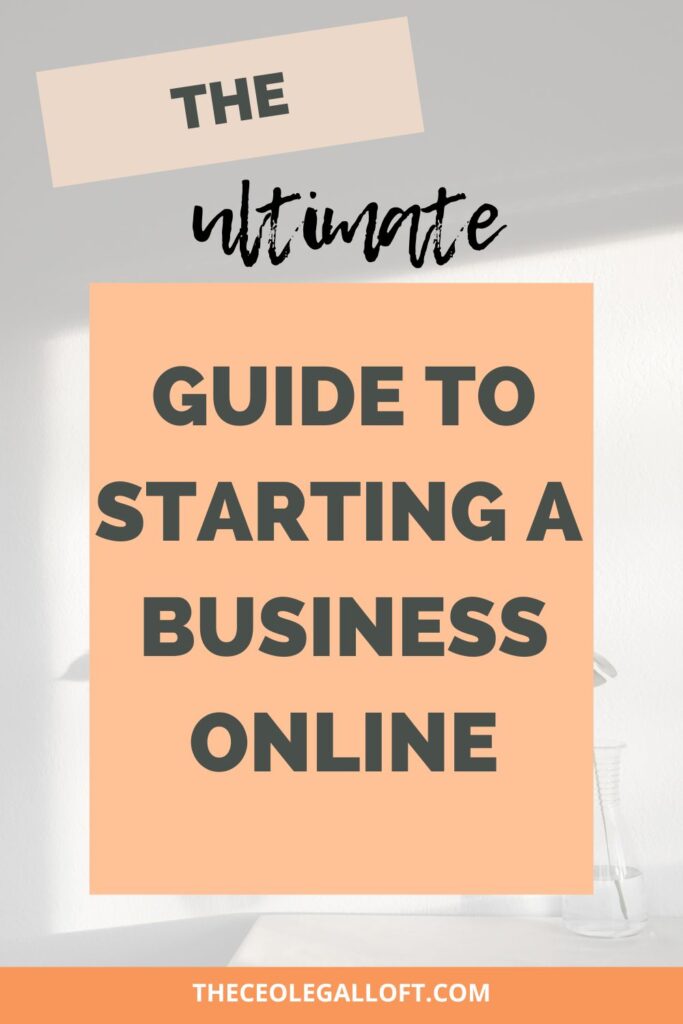
Market Research Methods for Your Online Business (That Won’t Get You Sued)
Traditional market research is fine like surveys, interviews, checking Google Trends for online business ideas. But add these legal considerations:
- Research your competitors’ and indirect competitor’s intellectual property. Don’t just look at what online businesses are selling. Look at what they’ve protected. Check if they have trademarks on their business names, course titles, or signature methods. This isn’t paranoia; it’s due diligence when starting an online business.
- Document your research process. Save screenshots, dates, sources. If someone later claims you copied their online business, you’ll have proof you did independent research.
Competitive Analysis Without IP Infringement
You can research online businesses without copying them. Here’s how to stay on the right side of the law:
- Analyze their public marketing, not their internal processes. Looking at someone’s sales page to understand their online business positioning? Fine. Signing up for their course to copy their curriculum structure? Not fine.
- Don’t use their proprietary language. If a competitor has trademarked terms like “The [X] Method” or “Ultimate [Y] System,” don’t use similar phrases for your online business. Come up with your own terminology.
- Focus on gaps, not replication. The goal isn’t to copy what works in their online business – it’s to find what’s missing. What problems AREN’T they solving? What complaints do their customers have? What legal protections do they lack that you can build into your online business from day one?
Industry-Specific Legal Considerations for Online Businesses
Different types of online businesses have different legal landmines. For example:
- Health and wellness online businesses: Don’t make medical claims unless you’re licensed. Words like “cure,” “treat,” or “diagnose” can get you in trouble with the FTC. Even calling yourself a “nutritionist” might require certification depending on your state.
- Financial advice online businesses: Huge regulatory issues if you’re giving investment advice without proper licenses. Even general money advice can cross legal lines if you’re not careful about disclaimers.
- Education and coaching online businesses: Less regulated, but be careful about claiming specific outcomes. “I’ll help you make six figures” could be considered a guarantee, which opens you up to legal issues if clients don’t see those results.
- Software and tech online businesses: Patent issues are everywhere. Even basic functionality might be protected. If you’re building an app, do a patent search before you invest serious development time.
- Content creation online businesses: Copyright issues if you’re using any third-party materials, music, images, or even discussing other people’s work. Fair use is narrower than most people think.
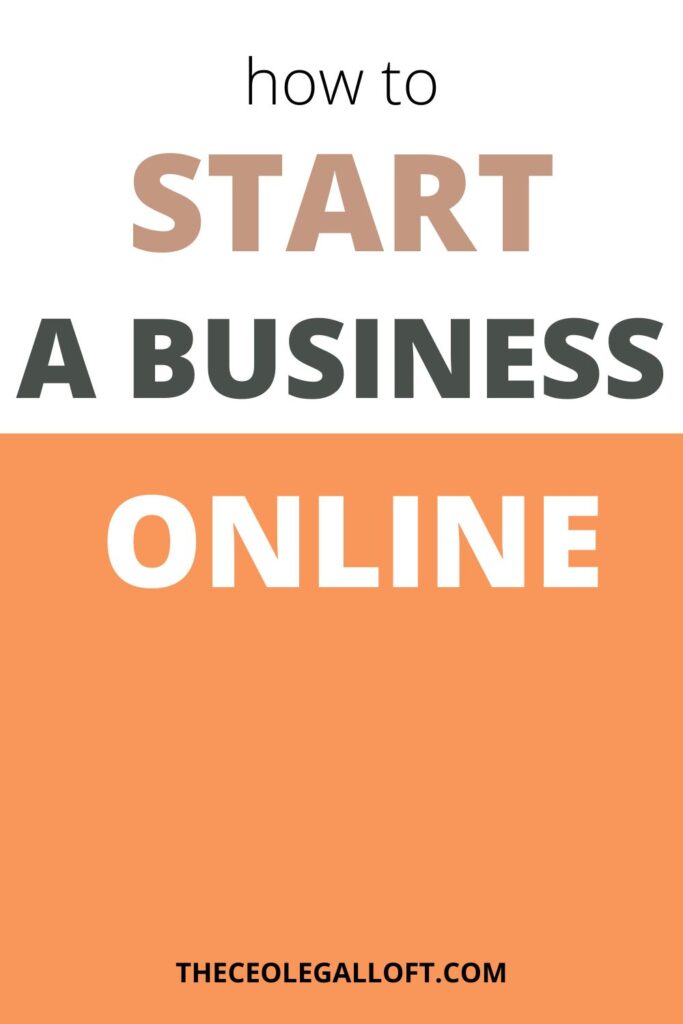
You could spend a few hundred dollars on proper searches now, or spend thousands on legal problems later.
Step 2: Choose Your Business Structure & Legal Entity
The business structure you choose when starting your online business affects a lot. Like how much you pay in taxes, whether your personal assets are protected if something goes wrong, how easy it is to bring on partners or sell your online business later, and even how legitimate you look to potential clients and customers.
LLC vs. Corporation: What Actually Matters for Online Businesses
LLCs are usually the right choice for most online business beginners, and here’s why that matters to you specifically. When someone sues your online business (and yes, it happens more than you think), they can’t come after your house, car, or savings account. Your personal assets stay personal.
The tax situation is simpler too. By default, LLCs are “pass-through” entities, which means profits and losses just show up on your personal tax return. No double taxation nonsense like corporations deal with.
Plus, the paperwork is actually manageable – you’re not dealing with board meetings, corporate resolutions, or stock certificates. You file one extra form at tax time and you’re done.
You might want a corporation instead in these specific situations:
- You’re planning to raise investment capital (investors understand stock ownership better)
- You want to go public eventually (only corporations can trade stock publicly)
- You have multiple owners with complex profit-sharing arrangements
- You’re in a high-liability industry that needs extra protection
But for 90% of online businesses run by beginners, an LLC is a better choice.
State Selection: Why Delaware Probably Isn’t Worth It
You don’t have to form your LLC in the state where you live, but you probably should anyway. Delaware and Nevada get all the hype in online business forums, but those states are great for large corporations with complex structures.
For your online coaching business or e-commerce store, you’re probably just adding extra costs and complications.
Even if all your clients are online, you’re physically working from your home state. That usually means you’ll need to register as a “foreign” LLC in your home state anyway if you form an LLC outside of your state.
That means double the fees and paperwork. Most states also charge foreign LLCs extra fees on top of the regular annual fees. And if you form in Delaware but live in California, you might have to file tax returns in both states.
The exceptions are pretty specific. If you’re planning to move soon, consider forming in your destination state. If your home state has genuinely terrible LLC laws (and only a few do), it might be worth the extra hassle.
If you have multiple business owners in different states, sometimes a neutral state makes sense. But for most people starting their first online business, home state filing is the way to go.
Tax Elections That Can Save You Thousands
The tax implications of your business structure choice are huge, and this is where I see people make expensive mistakes. By default, your LLC profits and losses flow through to your personal tax return.
You pay self-employment tax on all profits, but you also get to deduct business losses against other income.
But once your online business is consistently profitable – say, $60K+ per year – you might want to consider an S-Corp election. This can save you thousands in self-employment taxes, but it comes with more paperwork and requirements.
You’ll need to pay yourself actual W-2 wages (not just take distributions), handle payroll taxes, and file quarterly reports. The IRS gets cranky if you elect S-Corp status but pay yourself $500 per year while taking $80K in distributions.
Foreign Qualification
“Foreign qualification” doesn’t mean international business – it just means your LLC is “foreign” to any state other than where you formed it. You need to foreign qualify (register) in states where you have “nexus,” which for online businesses usually means:
- You have employees in that state
- You have a physical presence (office, warehouse, even a coworking space)
- You’re doing substantial business there (definitions vary by state)
The good news is that just having customers in a state usually isn’t enough to require foreign qualification. If you’re a coach with clients nationwide but you don’t have employees or offices in those states, you probably don’t need to register everywhere.
Sales tax is a different animal entirely – you might need to collect sales tax in states where you don’t need to foreign qualify, and vice versa.
Most online business beginners can start with a LLC in their home state and add complexity later as their business grows. Don’t let perfect be the enemy of good when you’re just starting your online business.
Ready to get your LLC set up the right way? I’ve seen too many entrepreneurs mess this up by trying to save a few bucks on legal fees, only to spend thousands fixing problems later. That’s why I created The LLC Launch.
This private podcast + ebook walks you through how to set up your LLC properly for your online business, what to include in your operating agreement, how to make the right tax elections from day one, and so much more.
Step 3: Setup Your Legal Foundation
When starting your online business, you need to understand that your business name, domain, and the licenses you need aren’t just administrative checkboxes. They’re part of the business infrastructure that determines whether you’ll operate long-term, or be forced to rebrand, relocate, or shut down entirely.
The goal isn’t just to start an online business. It’s to start one that will last.
Business Name Protection and Registration
You’ve done your trademark searches from Step 1, and you’ve found a name that’s legally available for your online business. Now you need to actually protect it before someone else grabs it.
- You can reserve your business name at the state level first. Most states let you reserve a business name for 30-120 days while you get your paperwork together. This costs maybe $10-50 and prevents someone else from snatching your name while you’re setting up your LLC. But this isn’t required, you can move forward with filing for your LLC, if you have all the information necessary to file.
- File your LLC formation documents. Once your LLC is officially formed, you have exclusive rights to that business name in your state for LLC purposes. But you should know that state registration only protects you within that state, and only for the specific business entity type you registered.
- Consider filing a DBA if you want to operate under a different name. A DBA (Doing Business As) lets you operate under a different name than your official LLC name. So if your LLC is “Smith Marketing Solutions LLC”, but you want to brand your online business as “Marketing Genius,” you’d file a DBA for “Marketing Genius.” This gives you legal permission to operate, advertise, and accept payments under that name.
Filing a DBA usually costs $10-100 depending on your state and typically needs to be renewed every few years. It’s a simple process, but don’t skip it – operating under a name you haven’t registered can create legal and banking complications down the road.
- Consider federal trademark protection for your online business name. This is where most people starting an online business get confused. Your LLC registration gives you some protection, but a federal trademark gives you nationwide protection for your business name in the specific categories you’re operating in. For online businesses that serve customers nationally, federal trademark protection is usually worth the investment.
The process takes 8-12 months and costs around $350 per class if you file yourself, or $1,000-2,500 if you hire an attorney. Yes, it’s an investment, but it’s a lot cheaper than being forced to rebrand your entire online business later because someone else trademarked the name you’ve been using.
Domain Name and Trademark Alignment
- Your domain name and business name don’t have to be identical, but they should make sense together. If your LLC is “Smith Marketing Solutions LLC” but your domain is “MarketingGenius.com,” that’s not necessarily a problem. It will be hard for people to remember your website, if it doesn’t go by the name you use to market.
- Register multiple domain variations to protect your online business brand. At minimum, get the .com, and consider the .net and .org versions too. If someone else owns YourBusinessName.net and starts a competing online business, that’s going to confuse your customers and potentially create legal headaches.
- Watch out for domain squatters. These are people who buy up domains similar to popular business names, hoping to sell them back at inflated prices. If you’re planning to expand your online business into related areas later, consider buying those domains now while they’re available at regular prices.
- International domains matter for online businesses. If you’re planning to serve customers internationally, consider registering your domain in key countries where you’ll be operating. YourBusiness.co.uk, YourBusiness.ca, etc. This prevents competitors from grabbing these domains and confusing your international customers.
Business Licenses and Permits
Most online businesses need fewer licenses than brick-and-mortar businesses, but “fewer” doesn’t mean “none.” The specific licenses you need depend on what type of online business you’re starting, where you’re located, and where your customers are located.
Start with your local business license. Many cities and counties require all businesses operating within their jurisdiction to have a general business license, even if you’re running your online business from your home office. This usually costs $50-200 per year and is pretty straightforward to get.
Sales tax permits are required if you’re selling products. If your online business involves selling physical products, digital products, or certain services, you’ll need to register for sales tax permits in states where you have “sales tax nexus.”
The rules for online businesses have gotten more complex since the 2018 Wayfair decision – you might need to collect sales tax in states where you don’t have a physical presence if you hit certain sales thresholds.
Industry-specific licenses can’t be ignored. Different types of online businesses have different licensing requirements:
- Food businesses: Even if you’re selling homemade products online, you might need food handler’s permits, cottage food licenses, or FDA registration
- Health and wellness: Nutritionists, personal trainers, and health coaches often need professional licenses that vary by state
- Financial services: Anything involving investment advice, insurance, or lending requires specific licenses and compliance measures
- Real estate: Online real estate courses, lead generation, or property management require real estate licenses in most states
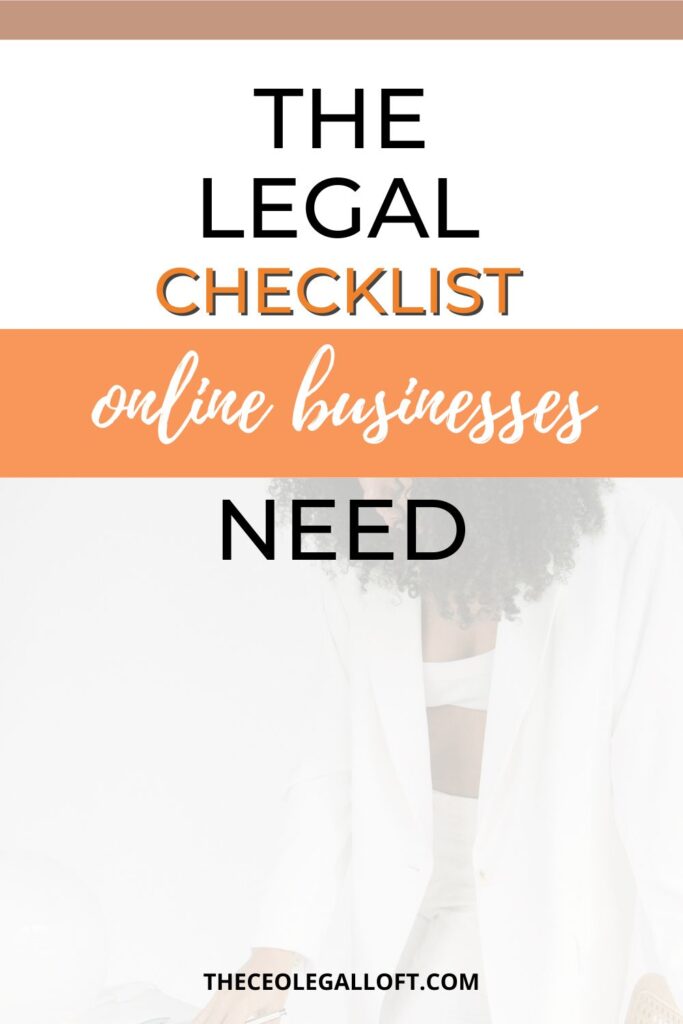
Professional Licenses: When Your Credentials Matter
Some online businesses require you to have professional credentials before you can legally operate. This is especially important if you’re starting an online business in a regulated industry.
- Licensed professions that commonly move online include: attorneys offering legal advice, CPAs providing tax services, doctors doing telemedicine consultations, therapists offering online counseling, and real estate agents doing virtual consultations. If you’re licensed in one state but want to serve clients online in other states, you might need to get licensed in those states too.
- Professional licensing for coaches and consultants is trickier. Business coaching, life coaching, and most types of consulting don’t require professional licenses in most states. But be careful about how you market yourself. Calling yourself a “financial advisor” or “nutritionist” might require specific credentials, even if “business coach” or “wellness coach” doesn’t.
- Continuing education requirements don’t disappear when you go online. If your offline profession requires continuing education credits to maintain your license, those same requirements apply to your online business. Plan for the time and cost of maintaining your professional credentials.
- Professional liability insurance becomes even more important for online businesses. When you’re serving clients remotely, miscommunications are more likely, and your insurance needs to cover online service delivery, not just in-person work.
Legal compliance isn’t sexy, but it’s not optional either. Spend a few weeks getting your legal foundation right when you start your online business, and you won’t have to spend months fixing legal problems later when you’re trying to scale.
Step 4: Set Up Compliant Business Operations
You’ve got your LLC formed, your business name protected, and your licenses in order. Now comes the part that separates actual businesses from expensive hobbies: setting up financial systems that keep you compliant with tax laws and protect your business from completely avoidable disasters.
Getting your business operations set up correctly from day one isn’t just about being organized. It’s about staying compliant with tax laws, protecting your LLC’s liability protection, and avoiding the kind of financial mistakes that can shut down your online business before it really gets started.
The IRS doesn’t care that you’re new to running an online business. State tax agencies don’t care that other guides didn’t explain sales tax nexus properly. Get this stuff wrong, and you’ll be dealing with penalties, interest, and potentially losing the liability protection you set up your LLC to get in the first place.
Business Banking and Financial Setup That Actually Protects You
You absolutely cannot run your online business through your personal bank account. I don’t care if you’re only making $500 a month right now. I don’t care if it seems easier to just use your personal checking account until you “get bigger.”
Using personal accounts for business transactions is one of the fastest ways to lose your LLC’s liability protection.
Open a dedicated business bank account before you make your first dollar. When you formed your LLC, you created a separate legal entity. That entity needs its own bank account to maintain its separate legal status.
Mixing business and personal funds is called “piercing the corporate veil,” and it can make your LLC worthless if someone sues your online business.
Most banks offer business checking accounts for LLCs, and many have low or no monthly fees for small businesses. You’ll need your LLC formation documents (Articles of Organization), your EIN (Employer Identification Number), and usually a copy of your operating agreement. Some banks also want to see your business license if your city requires one.
An EIN (Employer Identification Number) is like a social security number for your business. You can technically run a single-member LLC using your personal social security number, but getting an EIN is free, takes about 15 minutes online, and makes everything else easier.
Business Credit Cards: Start Building Credit Early
Get a business credit card in your LLC’s name, not yours. This serves multiple purposes for your online business.
First, it helps establish business credit separate from your personal credit. Second, it makes expense tracking infinitely easier when tax time comes around.
Third, many business credit cards offer rewards categories that align perfectly with online business expenses – things like software subscriptions, advertising spend, and office supplies.
Use your business credit card for all business expenses, and pay it off monthly. This builds your business credit history and gives you clear documentation of business expenses.
Just make sure you’re paying it off from your business bank account, not your personal account.
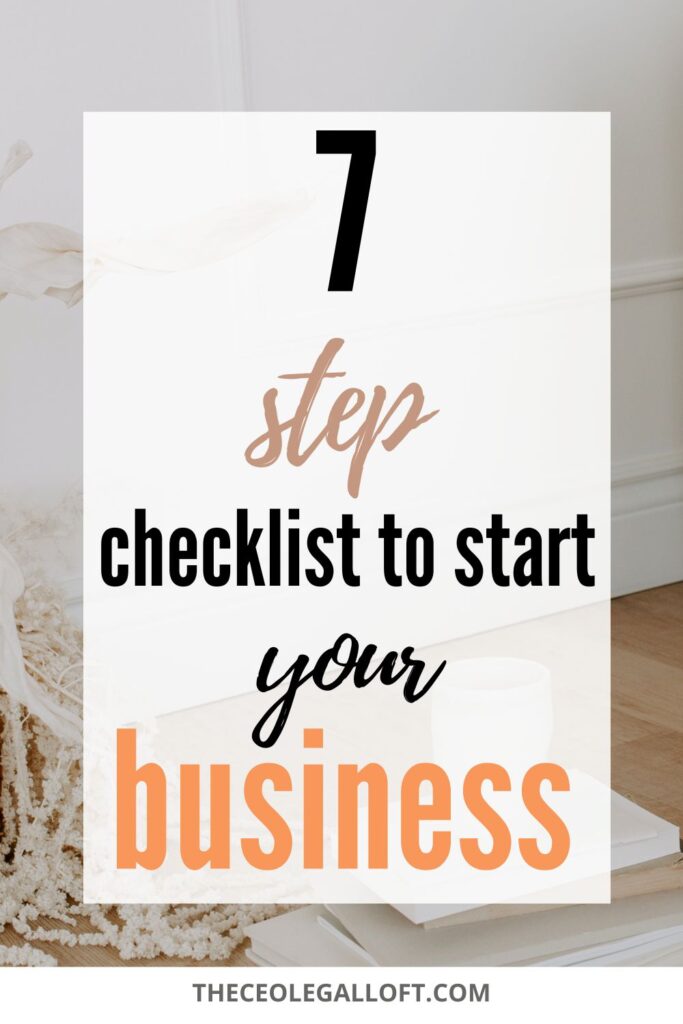
Bookkeeping Software: Set It Up Before You Need It
Choose your bookkeeping software now, before you have months of transactions to catch up on. QuickBooks Online is the standard for most small businesses, but there are cheaper options like Wave (which is free) or FreshBooks. I use Xero. The key is picking one and using it consistently from day one.
Connect your business bank account and credit card to your bookkeeping software. Most modern bookkeeping software can automatically import and categorize your transactions. Yes, you’ll still need to review everything, but it beats manually entering every transaction later.
Set up your chart of accounts properly for your online business. Your bookkeeping software will come with default categories, but you might need to add some specific to online businesses: website hosting, email marketing software, online advertising, digital product fees, etc.
If you don’t know what you’re doing and don’t have the time to learn, I highly recommend hiring a bookkeeper.
Separate Personal and Business Expenses Religiously
Never, ever pay for business expenses with personal funds or vice versa. If you accidentally pay for a business expense with your personal card, reimburse yourself properly through your business account. If you accidentally pay for a personal expense with your business card, pay it back immediately from your personal account.
Remember to keep receipts, save email confirmations, take photos of paper receipts before they fade. The IRS can ask for documentation of any business expense, and “I know I bought it but I can’t find the receipt” isn’t going to cut it.
Business Insurance Requirements
You should at least have general liability insurance as an online business owner. Even if you’re just selling digital products or offering coaching services, you can still get sued. A client could claim your advice caused them financial harm. Someone could say your digital product infringed on their intellectual property. General liability insurance typically costs $200-500 per year and can save you tens of thousands in legal fees.
Professional liability insurance (errors and omissions) is crucial if you’re providing advice or services. This covers you if a client claims your professional advice or services caused them financial damage. If you’re a doctor, lawyer, therapist, or anything of the like, you need this coverage.
Cyber liability insurance is becoming essential for online businesses. If you collect customer data (emails, payment information, personal details), you could be liable if that data gets breached. Cyber liability insurance covers the costs of data breach notifications, credit monitoring for affected customers, and legal fees. It’s usually pretty affordable for small online businesses.
Sales Tax Nexus and Registration
Sales tax for online businesses got a lot more complicated after the 2018 Wayfair decision. Before Wayfair, you generally only had to collect sales tax in states where you had a physical presence. Now, you might have to collect sales tax in states where you have “economic nexus” – basically, where you make a certain amount of sales or have a certain number of transactions, even if you’ve never set foot in that state.
Each state sets its own economic nexus thresholds. Some states require you to collect sales tax if you have $100,000 in sales or 200 transactions in that state in a year. Others have different thresholds. And some products are taxable while others aren’t, depending on the state.
Digital products add another layer of complexity. Software, online courses, digital downloads, and subscription services are treated differently in different states. Some states tax them as tangible personal property, others don’t tax them at all, and some have specific rules for digital goods.
Start tracking where your sales are going from day one. Even if you’re not required to collect sales tax yet, you want to know which states you’re approaching nexus thresholds in. Most e-commerce platforms and payment processors can give you this data, but you need to be tracking it.
Register for sales tax permits before you hit nexus thresholds, not after. Once you’re required to collect sales tax in a state, you’re usually required to collect it from the first dollar of sales that created nexus, not just going forward. Register proactively to avoid penalties.
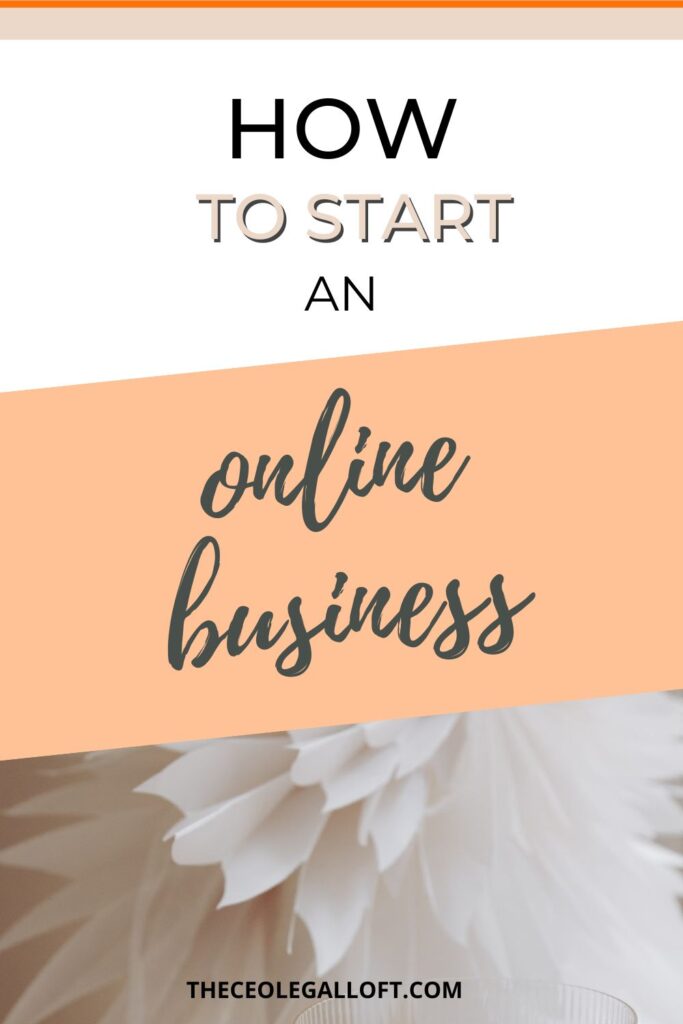
Step 5: Build Your Platform with Legal Compliance
Your website isn’t just a marketing tool for your online business – it can be looked at like a legal document. Every page, every form, every piece of content you publish creates potential legal obligations and liabilities. Most people starting an online business focus on making their website look pretty and convert visitors. That’s important, but it’s not enough.
A website without proper legal protections is like a business with the front door wide open and a sign that says “sue me.” You’re inviting legal problems that could have been prevented with a few hours of work upfront.
The legal pages on your website, your email marketing setup, and even your social media accounts need to comply with laws that most online business beginners have never heard of. Get this wrong, and you’re looking at fines from the FTC, lawsuits from customers, and potential shutdowns from platform violations.
Website Legal Pages That Actually Protect You
Every online business needs at least three legal pages. This includes a privacy policy, website terms of use, and website disclaimers. These aren’t just legal formalities – they’re your first line of defense against customer disputes, refund demands, and frivolous lawsuits.
Privacy Policy
Your privacy policy isn’t optional. If you collect any information from website visitors – email addresses, names, payment information, even basic analytics data – you’re legally required to have a privacy policy in most states. California’s CCPA, Europe’s GDPR, and various other privacy laws make this mandatory, not optional.
Your privacy policy needs to explain what information you collect, how you use it, who you share it with, and how people can request deletion of their data. The “I found a template online and changed the company name” approach isn’t going to cut it.
Different types of online businesses collect different types of data and have different legal obligations. GDPR requires explicit, informed consent for data collection. Your privacy policy needs to explain the legal basis for processing personal data.
You need procedures for handling data subject requests – when someone asks to see what data you have about them, update their information, or delete their data entirely.
Cookie consent is required under GDPR. If your website uses cookies (and most do, even for basic analytics), you need a cookie consent banner that lets visitors accept or reject non-essential cookies.
Terms of Service
Terms of Service (or Terms of Use) set the rules for how people can use your website and products. This is where you limit your liability, specify what happens if someone disputes a charge, explain your refund policy, and set expectations for customer behavior.
For online businesses, your Terms of Service can cover digital product delivery, account access, user-generated content (if you have forums or comments), intellectual property rights, and dispute resolution procedures.
Disclaimers
If your online business involves advice, coaching, or educational content, you need disclaimers. These protect you when customers don’t get the results they expected from your products or services.
Health and wellness businesses need disclaimers that their advice isn’t medical advice. Business coaches need disclaimers that they can’t guarantee income results. Financial educators need disclaimers that they’re not providing investment advice. Even fitness trainers selling online workout programs need disclaimers about injury risks.
Disclaimers need to be prominent and specific. Burying a generic disclaimer at the bottom of your Terms of Service isn’t enough. Put relevant disclaimers on sales pages, in course materials, and anywhere you’re making claims about potential results.
Email Marketing Compliance for Online Businesses
Email marketing laws are stricter than most online business owners realize. The CAN-SPAM Act in the US, GDPR in Europe, and CASL in Canada all have specific requirements for how you collect email addresses, what you include in your emails, and how you handle unsubscribe requests.
You need explicit permission to email people. “I found your email on your website” or “we connected on LinkedIn” isn’t permission to add someone to your email list. You need clear, documented consent – usually through an opt-in form on your website or a checkbox during purchase.
Double opt-in is becoming the standard for email marketing compliance. After someone signs up for your list, they get a confirmation email with a link they have to click to confirm their subscription. This creates a clear paper trail of consent that protects you if someone later claims they never signed up.
What are legal requirements for an email list?
- Every marketing email you send must include specific information. Your business name and physical address (a PO Box is fine), a clear way to unsubscribe, and identification that the email is an advertisement if it’s promotional content.
- Unsubscribe requests must be honored within 10 business days. You can’t make people jump through hoops to unsubscribe – no requiring them to log into an account, no making them explain why they’re leaving, no “are you sure?” emails. One-click unsubscribe is the gold standard.
- Keep records of when and how people subscribed. If someone complains to their email provider or files a CAN-SPAM complaint, you need to be able to prove they gave you permission to email them.
Social Media Compliance
- Your social media content can create legal obligations for your online business. The claims you make on Instagram, promises you make on Facebook, and advice you give on TikTok can all be held against you legally.
- FTC disclosure requirements apply to social media. If you’re promoting affiliate products, sponsored content, or your own products, you need clear disclosures. #ad, #sponsored, and #affiliate are the standard hashtags, but they need to be prominent and clear.
- Social media contests and giveaways have specific legal requirements. Official rules, eligibility restrictions, prize descriptions, and compliance with platform terms of service are all mandatory. Different states have different laws about contests and sweepstakes.
Accessibility Compliance (ADA)
Website accessibility isn’t just good practice, it’s increasingly started getting online businesses in legal trouble. The Americans with Disabilities Act (ADA) applies to websites, and lawsuits against businesses with inaccessible websites are becoming more common.
Basic accessibility requirements include alt text for images, proper heading structure, keyboard navigation, sufficient color contrast, and captions for videos. There are automated tools that can check your website for basic accessibility issues, but manual testing is also important.
E-commerce and course platforms need to pay special attention to accessibility. Shopping carts, checkout processes, and online learning platforms need to be usable by people with disabilities. This includes screen reader compatibility and keyboard-only navigation.
Content Protection and Copyright Compliance
Everything you create for your online business should be protected from day one. Blog posts, course materials, social media content, and marketing copy are all eligible for copyright protection the moment you create them.
Register important copyrights with the US Copyright Office. While your content is technically copyrighted as soon as you create it, registering gives you additional legal protections and the ability to collect statutory damages and attorney fees if someone infringes.
Be careful using third-party content. Stock photos need proper licenses. Music in videos needs licensing. Even sharing other people’s social media content can create copyright issues if you’re not careful about fair use.
Create clear content usage policies. If you want people to share your content, give them clear guidelines about what’s allowed. If you don’t want people sharing your content, make that clear too with copyright notices and terms of use.
Legal compliance for your online business platform isn’t optional, and it’s not something you can figure out later. Build these protections into your website and marketing systems from day one, and you’ll avoid the expensive legal problems that derail so many online businesses after they start gaining traction.
Step 6: Launch with Bulletproof Contracts
You’ve built your legal foundation and set up compliant operations. Now comes the moment when your online business starts interacting with real people who want to pay you money – and who might decide later that they want that money back, or that you didn’t deliver what they expected.
Every interaction your online business has with customers and contractors creates a legal relationship. The question is whether you’re going to define the terms of that relationship, or let a judge decide them for you later.
Client Service Agreements That Get You Paid
When you’re selling services to clients, a handshake deal or email exchange isn’t enough protection. Client service agreements are your primary defense against scope creep, payment disputes, and difficult clients who try to get more than they paid for.
If you’re selling services – coaching, consulting, design, marketing – you need a service agreement for every client. Not a proposal, not an email exchange. A real contract that covers what work you’re doing, when you’re doing it, how much you’re charging, when payment is due, and what happens if someone wants changes.
Include payment terms that actually work. Specify exactly when payment is due, include late fees for overdue invoices, and make the client responsible for attorney fees if you have to collect. This gives you real leverage when someone avoids payment.
Define your scope clearly and limit revisions. Include a specific number of revisions in your base price, then charge extra for additional changes. Have a process for documenting additional work before you do it.
Contractor Agreements for Your Virtual Team
As your online business grows, you’ll likely hire freelancers and contractors. Without proper agreements, you risk losing ownership of work you paid for, having confidential information shared with competitors, or facing employment law issues.
When you hire freelancers for your online business, you need agreements that ensure you own the work you’re paying for. Your contract should specify that you own all work product – logos, website code, content, etc. Most intellectual property laws default to the creator owning the work unless there’s a clear agreement otherwise.
Don’t forget to include confidentiality provisions when contractors have access to your business strategies, customer lists, or proprietary methods.
Digital Product Terms
If you’re selling digital products like online courses, memberships, or downloadable content, standard website terms of service aren’t enough. You need specific purchase terms that address the unique challenges of digital products.
If you’re selling online courses, digital products, or memberships, your purchase terms should cover when access begins, how long it lasts, your refund policy, and what happens if someone shares login credentials.
Refund policies for digital products need special consideration since they can’t be “returned” like physical products.
When to Get Professional Help
Start with solid template contracts, then upgrade to custom agreements as your online business grows. Most beginners can use well-written templates for basic client work and contractor relationships. You’ll need custom contracts when you’re doing complex partnerships, handling high-value deals, or entering regulated industries.

Ready to protect your client relationships? The Business Builder Bundle includes service agreements, contractor templates, and digital product terms specifically designed for online businesses. These aren’t generic templates – they’re written for the real challenges online businesses face.
Step 7: Protect Your Growing Brand
Now that your online business is gaining traction, getting customers, and building an audience, that’s when the vultures start circling. Competitors who notice your success and decide to “borrow” your business name, course titles, or marketing copy. Copycats who steal your content and try to pass it off as their own. Amazon sellers using your brand name on knockoff products.
Success makes you a target. The question is whether you’re going to be an easy target or a protected one.
Most online business owners assume intellectual property theft won’t happen to them until it does. By then, the copycat has built their business around your stolen ideas, and removing them becomes exponentially harder and more expensive.
The good news is that protecting your growing online business brand doesn’t require hiring a team of lawyers or spending thousands on legal fees. It requires knowing what to look for, having the right tools in place, and taking swift action when you find problems.
Monitor for Copycats and Infringement
The first step in protecting your brand is knowing when someone’s attacking it. By the time customers start asking you about your “other website” or why your prices are different somewhere else, the damage is already done.
You can’t protect what you don’t know about. Setting up monitoring systems should be one of your first priorities as your online business gains visibility.
Google Alerts are free and surprisingly effective. Set up alerts for your business name, course titles, signature phrases, and any unique terminology you use in your online business. You’ll get email notifications when these terms appear online, which can help you catch copycats early.
Reverse image searches can find stolen graphics and photos. Upload your key images – logos, course graphics, social media posts – to Google’s reverse image search periodically. This will show you other websites using your images, which can help you identify content thieves.
Social media monitoring tools can track brand mentions across platforms. Tools like Mention or Brand24 can monitor for your business name and key phrases across social media, blogs, and news sites. Some have free tiers that work well for small online businesses.
Domain Monitoring and Protection
Your domain name is often the first thing customers think of when they want to find your business. Competitors and domain squatters know this, which is why they try to register similar domains to confuse your customers or sell them back to you at inflated prices.
- Register similar domain variations before someone else does. If your online business is at YourBusiness.com, consider grabbing YourBusiness.net, YourBusiness.org, and common misspellings before competitors or domain squatters do.
- Set up domain monitoring alerts. Services like DomainTools or NameSentry can alert you when someone registers domains similar to yours. This gives you early warning if competitors are trying to capitalize on your brand name.
- Watch for trademark applications that might conflict with your brand. The USPTO publishes all trademark applications, and there are monitoring services that can alert you when someone files for a mark similar to yours.
Make Your Business Harder to Copy
The best defense against copycats isn’t legal action – it’s building a business that’s difficult to replicate in the first place. Anyone can steal your marketing copy or course outline, but they can’t steal your expertise, your relationships, or your reputation.
- Focus on building strong customer relationships. Copycats can copy your products, but they can’t copy the trust and loyalty you’ve built with your customers. Invest in customer service, community building, and ongoing value delivery that keeps customers coming back to you instead of switching to cheaper imitators.
- Develop proprietary systems and methods. While you can’t always prevent people from copying your ideas, having clearly defined and trademarked methods makes it easier to take legal action when they do. Document your unique processes, give them distinctive names, and consider trademark protection for your signature methods.
- Build a strong personal brand alongside your business brand. People can copy your business model, but they can’t copy you. The more your online business is tied to your personal expertise and reputation, the harder it is for competitors to replicate your success.
- Stay ahead of the copycats by continuously innovating. By the time someone figures out how to copy your current offering, you should already be working on the next evolution of your online business.
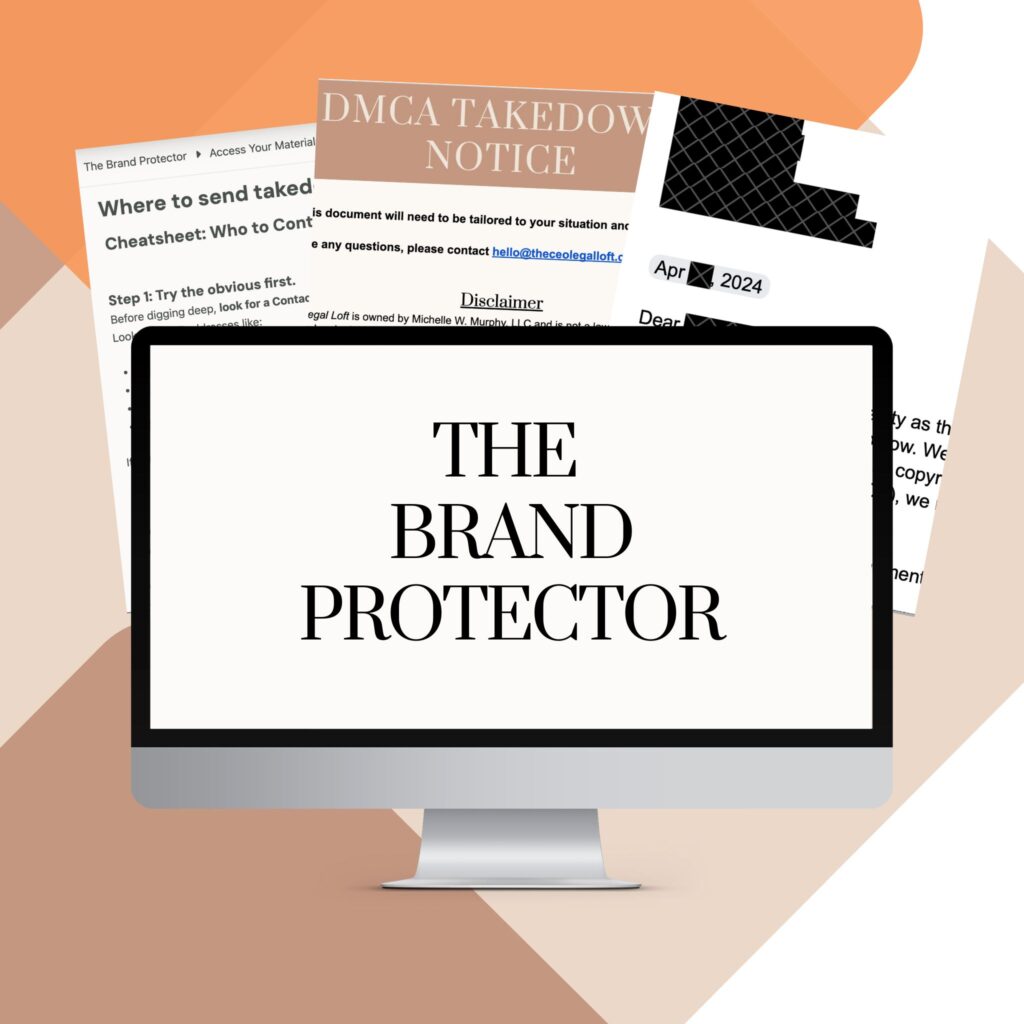
Need help protecting your content right now? The Brand Protector includes DMCA takedown templates, cease and desist letters, and step-by-step instructions for getting stolen content removed from major platforms. It’s the same process I use to protect my clients’ intellectual property, available for a fraction of the cost of hiring an attorney.
Protecting your online business brand isn’t about being paranoid or aggressive – it’s about being prepared. Set up monitoring systems, know your options when problems arise, and build a business that’s valuable enough to protect and strong enough to defend.
FAQ: Legal Questions for New Business Owners
Do I really need an LLC if I’m just starting my online business?
It depends on your personal assets, industry risk, and how serious you are about the business. If you have significant personal assets (home, savings) or you’re in a higher-risk industry (coaching, health, finance), an LLC is worth getting from day one. If you’re just testing a business idea with minimal revenue and few assets to protect, you might start as a sole proprietorship and upgrade to an LLC once you validate the concept and start making real money.
Can I use my personal bank account temporarily for my online business?
No, absolutely not. Using your personal bank account for business transactions is one of the fastest ways to lose your LLC’s liability protection. It’s called “piercing the corporate veil” and it can make your business formation worthless. Open a business bank account before you make your first dollar – most banks offer low-cost options for new online businesses.
What happens if I don’t get the required business licenses?
Operating without required licenses can result in fines, penalties, and even forced closure of your online business. Different types of online businesses have different licensing requirements, but most need at least a general business license from their city or county. The cost of getting proper licenses upfront is always less than the penalties for operating without them.
What’s the difference between a DBA and a trademark when starting an online business?
A DBA (Doing Business As) lets you operate under a different name than your official LLC name – like if your LLC is “Smith Consulting LLC” but you want to do business as “Business Growth Experts.” It’s filed at the state level and costs $10-100. A trademark gives you nationwide protection for your business name and can prevent competitors from using similar names. Trademarks cost more but provide much stronger protection for online businesses that serve customers nationally.
Do I need a trademark if I already have an LLC for my online business?
Your LLC registration only protects your business name within your state and only for LLC purposes. If you’re starting an online business that serves customers nationwide, a federal trademark gives you much stronger protection. Competitors in other states could potentially use your business name if you only have state-level LLC protection. For most online business beginners, it’s worth considering trademark protection once you’re established and profitable.
Can I write my own contracts or do I need to hire a lawyer?
You can start with well-written contract templates designed specifically for online businesses, then upgrade to custom contracts as your business grows. Most online business beginners can use quality templates for basic client work and contractor relationships. You’ll need custom contracts when you’re doing complex partnerships, handling high-value deals, or entering regulated industries. Templates save you thousands in legal fees while still providing solid protection.
What legal pages does my online business website actually need?
Every online business needs at least three legal pages: Privacy Policy, Terms of Service, and Disclaimers. If you collect any visitor information (even just email addresses), a Privacy Policy is legally required under various state and federal laws. Terms of Service protect you from customer disputes and set expectations. Disclaimers are crucial if you’re providing advice, coaching, or educational content. Don’t copy these from other websites – they need to match your specific business model.
Do I need business insurance for an online business?
Yes, most online businesses should have at least general liability insurance and professional liability insurance. Even if you’re just selling digital products or coaching services, you can still get sued. A client could claim your advice caused financial harm, or someone could say your content infringed their intellectual property. Business insurance typically costs $200-500 per year and can save you tens of thousands in legal fees. If you collect customer data, cyber liability insurance is also becoming essential.
How do I know if I need to collect sales tax for my online business?
Sales tax for online businesses got complicated after the 2018 Wayfair decision. You might need to collect sales tax in states where you have “economic nexus” – typically $100,000 in sales or 200 transactions per year, even if you’ve never been to that state. Different states have different thresholds, and digital products are treated differently than physical products. Start tracking where your sales are going from day one, and register for sales tax permits before you hit nexus thresholds.
What’s the biggest legal mistake online business beginners make?
Operating on handshake deals and assumptions instead of proper contracts. Whether it’s client agreements, contractor relationships, or business partnerships, informal arrangements lead to expensive disputes later. The second biggest mistake is mixing personal and business finances, which can destroy your LLC’s liability protection. Both of these problems are completely preventable with a few hours of upfront planning when you start your online business.
Protecting your online business brand isn’t about being paranoid or aggressive – it’s about being prepared. Set up monitoring systems, know your options when problems arise, and build a business that’s valuable enough to protect and strong enough to defend.
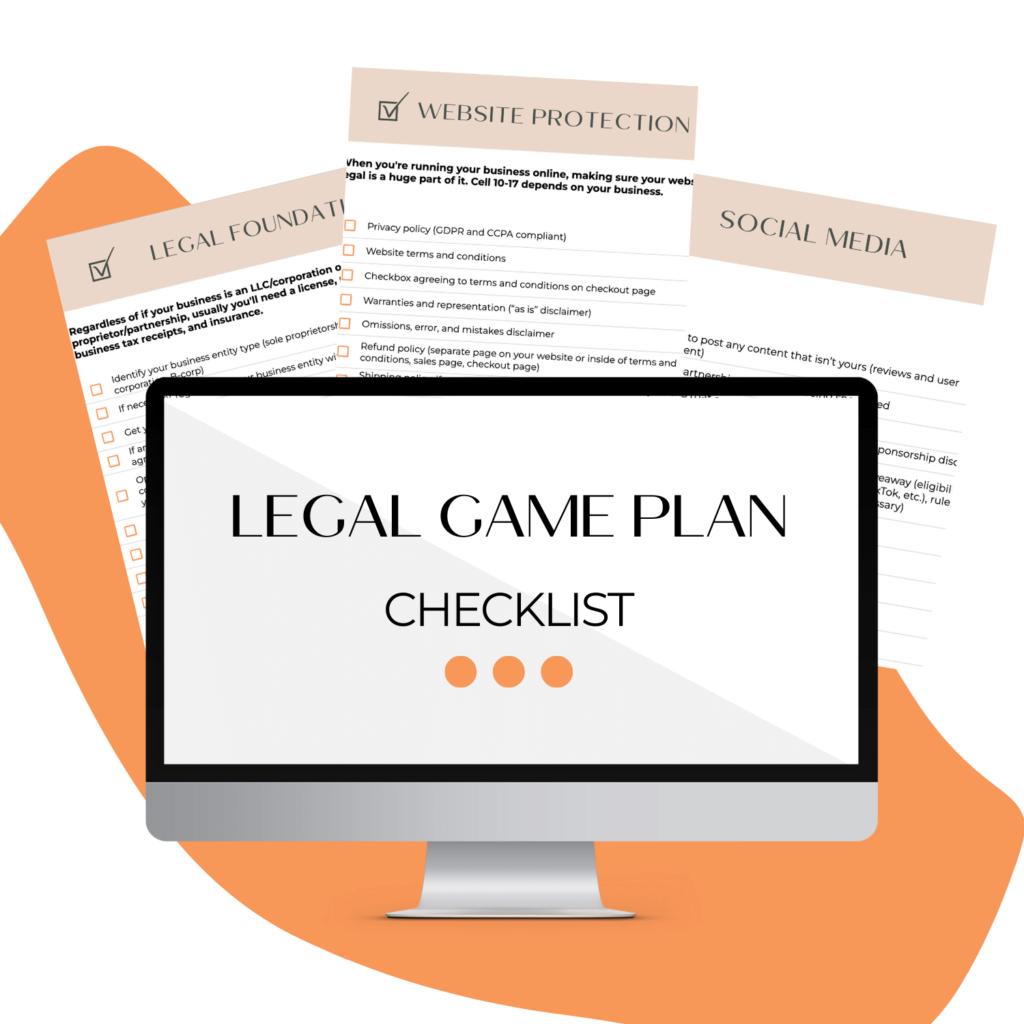
If you want a legal assistant that you can ask your questions and was set up a practicing attorney, check out The Legal Game Plan. It’s a legal checklist with 100+ items that’s searchable by AI—ask any question and get instant educational content with explanations and action steps.


+ show Comments
- Hide Comments
add a comment